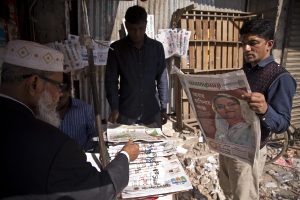Relations between Bangladesh and the U.S. appear to have run into some trouble, with the U.S. closely monitoring and admonishing the Bangladesh government for alleged undemocratic practices and human rights violations.
On April 13, the U.S. government released 2021 Country Reports on Human Rights Practices. The report on Bangladesh questioned the legitimacy of the current government.
The report states that “in a December 2018 parliamentary election, Sheikh Hasina and her Awami League party won a third consecutive five-year term that kept her in office as prime minister. This election was not considered free and fair by observers reportedly due to irregularities, including ballot-box stuffing and intimidation of opposition polling agents and voters.”
The report also makes observation on the imprisonment of Khaleda Zia, former prime minister and chairperson of the opposition Bangladesh Nationalist Party. “International and domestic legal experts commented on the lack of evidence to support the conviction and suggested a political ploy to remove the leader of the opposition from the electoral process,” the U.S. report said.
Earlier on December 10, the U.S. government imposed sanctions on six high-ranking officials of Bangladesh’s Rapid Action Battalion (RAB), including its current inspector general of police, for “serious human rights abuse” in Bangladesh. According to the U.S. Department of Treasury, which took the action under the Global Magnitsky Human Rights Accountability Act 2016, RAB and other Bangladeshi law enforcement organizations are responsible for “more than 600 disappearances since 2009, nearly 600 extrajudicial killings since 2018, and torture.” Opposition party members, journalists, and human rights activists were among the victims.
Additionally, Bangladesh was not invited to President Joe Biden’s Democracy Summit on December 9-10.
Bangladesh and the U.S. marked the 50th anniversary of bilateral relations on April 5. The U.S. is one of Bangladesh’s main development partners. In fact, it was the single largest market for Bangladeshi goods in the world in 2018. Bangladesh is also the largest recipient of U.S. assistance in Asia, after Afghanistan and Pakistan. Moreover, the two countries also collaborate on economic, security and governance issues.
Bangladesh’s location in the Bay of Bengal gives it much geostrategic importance. According to noted geopolitical analyst Robert Kaplan, “the Indian Ocean will be the center of global conflicts” because it is through this ocean that much of the world’s business and trade is being conducted. Moreover, India, China, and the United States’ interests and influences are beginning to overlap and intersect in the Indian Ocean. It is here, as Kaplan says, that the 21st century’s “global power dynamics will be revealed.”
These realities came to the forefront when U.S. Secretary of Navy Ray Mabus paid a quiet but significant visit to Dhaka in 2015.
So why does the U.S. want to create pressure on the Bangladesh government by questioning the 2018 election? Why is the U.S imposing sanctions on the RAB now? Why was Bangladesh not invited to the Democracy Summit even though countries that are lower on the democracy index were invited?
Geopolitical issues might be playing a role in the U.S. decision to pressure the Bangladesh government. While the U.S.-led Quad – an informal strategic forum comprising the U.S., India, Australia, and Japan— is in place to check China’s influence in the Indo-Pacific region, Bangladesh has not yet confirmed its official allegiance to Quad due to huge Chinese investment and supply of anti-COVID-19 vaccines to the country.
Deputy Secretary of State Stephen E. Biegun visited Bangladesh in October 2020 and formally invited Bangladesh to join the Quad. He said: “The U.S. sees Bangladesh as a key partner in the Indo-Pacific region … we are committed to growing our partnership in this regard to advance a free and open Indo-Pacific. Bangladesh will be the centerpiece of our work in the region.”
The Chinese ambassador to Dhaka has categorically warned Bangladesh against joining the Quad, saying that Bangladesh’s relations with China will “substantially be damaged” if it does so. Meanwhile Russia came out in support of Bangladesh when it was not invited to the Democracy Summit.
Bangladesh’s external relations are getting complex because all the regional and global powers, including the U.S., India, China, Russia, and Japan are actively involved in Bangladesh.
Mistrust has emerged between India and Bangladesh over Chinese funding to the construction of an airport terminal in Sylhet. Prime Minister Sheikh Hasina did not meet India’s High Commissioner Riva Ganguly Das in 2020 despite the latter’s repeated requests for a meeting.
Meanwhile, Bangladesh was among 35 countries that abstained in the United Nations General Assembly Resolution criticizing Russia’s decision to go to war with Ukraine but voted against Russia in another U.N. General Assembly resolution that criticized Russia for creating a humanitarian crisis and demanded aid for Ukraine.
Bangladesh Foreign Secretary, Masud Bin Momen said recently that Bangladesh has a “historical relation” with Russia, and continues to maintain a very close relationship with Moscow. “It is very difficult for the country to try to adjust the relationship, even if anyone would like it to amid the current situation in Ukraine,” Momen said.
Since his inauguration, Biden has made it clear that strengthening and renewing democracy across the globe is fundamental to his policies. This emphasis is putting Bangladesh under pressure. How Dhaka deals with the human rights issues raised by the U.S. and its sanctions on Bangladesh will determine the future of bilateral relations and the role Bangladesh will play in geopolitical rivalries.
No doubt, Bangladesh’s efforts to please all powers and to maintain good relations with all is getting difficult.

































